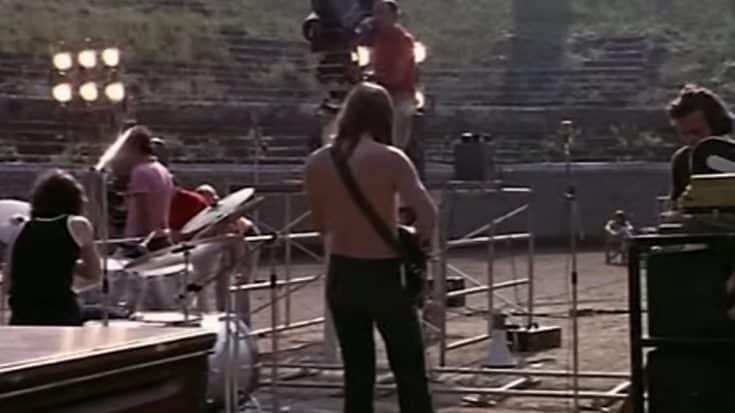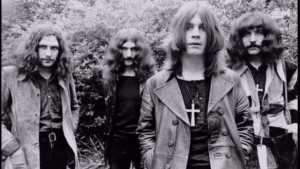The Truth Behind Pink Floyd’s “Run Like Hell”

via Youtube @JuanaPranayama
Although most people would classify the legendary Pink Floyd as a rock and roll group, their discography doesn’t always fit the mold. As progressive rock pioneers, instead of causing fans to headbang wildly, their music frequently takes them to surreal places.
But in the outlier stomper “Run Like Hell”, Pink Floyd purposefully wakes everyone up from their dream by presenting a forceful fusion of muscular guitars and booming drumming. Their capacity to explore the gritty territories held by their rock rivals is demonstrated by this musical departure.
The unique aspect of “Run Like Hell” is enhanced by Roger Waters’ high-pitched screech delivery of the words, which adds an intriguing element of ambiguity. Once you get past the noticeable drums and guitars, it becomes an interesting task to figure out the song’s story.
What is the song’s specific subject matter, and how does it fit into the album’s overall scheme? In order to solve these puzzles, it is essential to examine the track’s complex structure and comprehend its place in Pink Floyd’s overall musical arc.
What inspired the iconic double album The Wall
Against the backdrop of Pink Floyd’s turbulent 1977 tour—which was prompted by a sense of alienation fans felt from the band during the Animals album era—Waters, who had taken on the role of lead lyricist for the band and was also gradually directing its musical direction, had an epiphany.
He was dissatisfied with the lack of interaction during live concerts and had an idea for a metaphorical wall that would divide the audience and the band. This idea would eventually become the masterpiece known as The Wall.
This breakthrough double album released in 1979 tells the story of Pink, a rock star whose life is full of memories of pain, troubles in the present, and echoes of the band’s own past.
A multi-layered narrative resonating with universal themes of alienation and introspection is created by the legendary bassist weaving his own personal struggles, such as the theme of a father lost to war, into the storyline of the album. The Wall also pays homage to the mysterious Syd Barrett, Pink Floyd’s original frontman ousted due to mental health issues.
A portrayal of Pink’s spiral into madness
As The Wall develops, Pink, depleted by his experiences, experiences a psychiatric breakdown. He imagines himself taking on the role of a fascist rock star during this bizarre voyage, using music as a dividing rather than a uniting factor.
In this convoluted story, “Run Like Hell” appears as a musical interlude, a warning cry to those who cannot follow Pink’s perverted purpose. The song captures the larger themes of disillusionment and societal fragmentation that run throughout the entire album, becoming a sound representation of the character’s decline into a bizarre existence.
Not only is “Run Like Hell” a great rock song, but it’s also an important piece in the complicated puzzle that is Pink’s journey, and it marks a turning point in The Wall. Its forceful and aggressive music offers a visceral and gritty portrayal of the character’s spiral into lunacy, standing in stark contrast to the dreamy trances frequently associated with Pink Floyd.
One would discover levels of symbolism and meaning by examining the music’s position within the larger story, which provides a deeper comprehension of the song and The Wall as a whole.
A defiant collaborative effort that shines on its own
As the 1980s dawned, this was not the kind of upbeat message one might have expected to hear on rock radio. Still, “Run Like Hell” has several qualities that elevated it to the status of classic rock standards. In an attempt to break Pink Floyd from their pattern of expansive soundscapes, Roger Waters chose shorter song structures that would be more appropriate for rock radio play.
Guitarist David Gilmour’s strong participation was a key factor in the song’s lasting appeal. Waters wrote most of the music for The Wall, but Gilmour was more forceful when it came to forming “Run Like Hell”. Waters’ original demo called for a glam-rock ballad, but Gilmour stepped in, giving the song a faster tempo and turning it into a powerful piece of defiant rock.
The power of the song was further enhanced by the band members’ joint efforts. The music was driven by Nick Mason’s strong four-on-the-floor beat, while Gilmour’s guitar work was all over the song, appearing sparingly during the verses and taking center stage with the main theme.
Even though he was no longer with the band by the time the album was finished, Rick Wright nonetheless made a compelling synthesizer solo that elevated the overall arrangement. The band’s versatility and creative prowess were showcased by their combined efforts, solidifying “Run Like Hell” as a dynamic and varied song within Pink Floyd’s repertoire.
You don’t have to be a The Wall fan to appreciate this song
The structure of “Run Like Hell” is fascinating since it may be enjoyed without any prior knowledge of Pink’s tragic story. It serves as a global alert, pleading with people who value humanity and empathy to be on guard against malicious influences.
Even with the potentially harsh imagery (e.g., Waters’ frantic yelp about nerves in tatters and cockleshells shattering) and the menacing suggestion in the second verse that intimacy could result in punishment, the song stays optimistic without going overboard thanks to its triumphant guitar chords and relentless pace.
The overall ambiance is energetic and dynamic despite the stark lyrics. Notably, a big part of the song’s appeal comes from the band’s unquestionable chemistry.
Ironically, Pink Floyd was suffering from internal fractures as “Run Like Hell” was being created. If this was the band’s final song together, then it shows how resilient they were because they closed the show with a strong, defiant classic.












